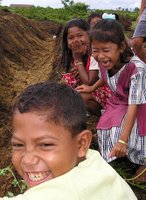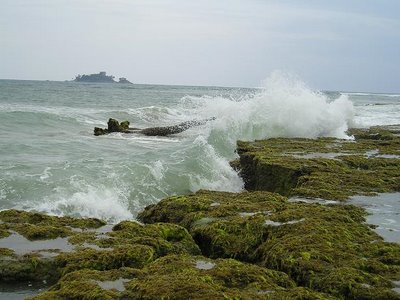September 29th - Bulan puasa
This week I have been going back and forth between Calang and Teunom, our two field offices in the district of Aceh Jaya.  Saturday was Syakban, the day before the start of Ramadan (bulan pusa). In Calang, this was celebrated by setting up a camp on the beach in a place called Jabi, where most of the male local staff spent the night from Friday to Saturday. As is customary, on Friday night we all chipped in to buy a goat for the occasion… and Saturday morning we had a delicious curry!
Saturday was Syakban, the day before the start of Ramadan (bulan pusa). In Calang, this was celebrated by setting up a camp on the beach in a place called Jabi, where most of the male local staff spent the night from Friday to Saturday. As is customary, on Friday night we all chipped in to buy a goat for the occasion… and Saturday morning we had a delicious curry!
Ramadan is the ninth month of the Islamic calendar in a Muslim year. It is the fasting month. This year, it starts on the 24th of September and ends on the 23rd of October, with Idul Fitri or Eid Al-Fitr (24th and 25th of October), which is informally referred to as Lebaran in Indonesia.  Ramadan is a time when Muslims concentrate on their faith and spend less time on the concerns of their everyday lives. It is a time of worship and contemplation. For the rest, productivity declines and the pace of life is significantly slowed down. Special arrangements for breakfast and lunch have to be made for non-Moslems expats. Food stalls and restaurants are all closed in the field. The evening meal, however, with the breaking of the fast (iftar or buka puasa) is particularly delicious and is accompanied with many sweet foods. It also takes some getting used to the amplified calls to prayers from the many mosques in the wee hours of the night and, in Teunom, the loud sirens to waken the faithful who fast early in the morning to have a meal before dawn (subuh).
Ramadan is a time when Muslims concentrate on their faith and spend less time on the concerns of their everyday lives. It is a time of worship and contemplation. For the rest, productivity declines and the pace of life is significantly slowed down. Special arrangements for breakfast and lunch have to be made for non-Moslems expats. Food stalls and restaurants are all closed in the field. The evening meal, however, with the breaking of the fast (iftar or buka puasa) is particularly delicious and is accompanied with many sweet foods. It also takes some getting used to the amplified calls to prayers from the many mosques in the wee hours of the night and, in Teunom, the loud sirens to waken the faithful who fast early in the morning to have a meal before dawn (subuh).
Click here for more information about Ramadan in
 On Monday I went with the new field office manager from Calang to Teunom, roughly three quarters of an hour driving. I always like coming to Teunom; it is a very cosy place and I always seem to be able to unwind there. It has much in the way of a local Non Governmental Organisation (NGO), where the people often work and live in the same building. It is easy to get the wrong idea when walking into the office in the afternoon. The generator is turned off between 13:00 and 18:00 and, when no field visits are planned, the staff is either sleeping or playing scrabble. This surprised me the first time I went to the office and so too did it surprise the new manager (the afternoon hours are then compensated for in the evening, when the power is back on).
On Monday I went with the new field office manager from Calang to Teunom, roughly three quarters of an hour driving. I always like coming to Teunom; it is a very cosy place and I always seem to be able to unwind there. It has much in the way of a local Non Governmental Organisation (NGO), where the people often work and live in the same building. It is easy to get the wrong idea when walking into the office in the afternoon. The generator is turned off between 13:00 and 18:00 and, when no field visits are planned, the staff is either sleeping or playing scrabble. This surprised me the first time I went to the office and so too did it surprise the new manager (the afternoon hours are then compensated for in the evening, when the power is back on).
 The Teunom teams are really good and perform well. So I was chocked to find out that four persons had resigned recently, including all three team leaders. Staff turnover is a big problem, especially in Calang and Teunom. This month is worse than usual because it is a strategic moment to stop; they will be free when Lebaran comes and still receive their extra months’ salary. But people are strategic in this way everywhere! It is just a shame to loose so many good people; it is not easy to find suitable candidates to replace them.
The Teunom teams are really good and perform well. So I was chocked to find out that four persons had resigned recently, including all three team leaders. Staff turnover is a big problem, especially in Calang and Teunom. This month is worse than usual because it is a strategic moment to stop; they will be free when Lebaran comes and still receive their extra months’ salary. But people are strategic in this way everywhere! It is just a shame to loose so many good people; it is not easy to find suitable candidates to replace them.
 In Teunom, I went with the new manager on some monitoring visits in the villages of Cot Trap, Teupin Asan and Seunebok Padang. In addition I have collected GPS coordinates from the sub-villages we work in so that the Spatial Information and Mapping Centre (SIM) – set up by the Office of the United Nations Recovery Coordinator for Aceh and Nias (UNORC) and Aceh and Nias Rehabilitation and Reconstruction Board (BRR) – can customise a number of maps for us. And finally I have been to a number of CDR communities in Teunom and Calang for our Child Youth Protection and Development (CYPD) department to assess whether or not there are school committees.
In Teunom, I went with the new manager on some monitoring visits in the villages of Cot Trap, Teupin Asan and Seunebok Padang. In addition I have collected GPS coordinates from the sub-villages we work in so that the Spatial Information and Mapping Centre (SIM) – set up by the Office of the United Nations Recovery Coordinator for Aceh and Nias (UNORC) and Aceh and Nias Rehabilitation and Reconstruction Board (BRR) – can customise a number of maps for us. And finally I have been to a number of CDR communities in Teunom and Calang for our Child Youth Protection and Development (CYPD) department to assess whether or not there are school committees.  School committees consist of headmasters, teachers, parents and other interested parties whose function it is to decide on school policies. The committees effectively contribute to the involvement of community members in educational matters, decentralise decision-making and promote transparency, which is especially important in a country where corruption is a serious issue. In the future, the Community Development Boards (CDBs) might possibly play a role in reactivating school committees where they are not active and might work together to develop and implement educational project proposals.
School committees consist of headmasters, teachers, parents and other interested parties whose function it is to decide on school policies. The committees effectively contribute to the involvement of community members in educational matters, decentralise decision-making and promote transparency, which is especially important in a country where corruption is a serious issue. In the future, the Community Development Boards (CDBs) might possibly play a role in reactivating school committees where they are not active and might work together to develop and implement educational project proposals.
It will leave it at this. See you next week!
Take care,
Alex









0 Comments:
Post a Comment
<< Home